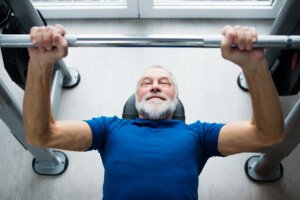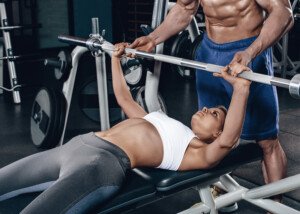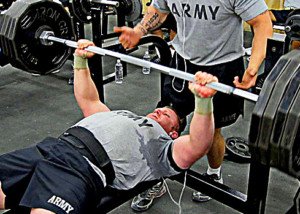
Why do so few elderly people at the gym bench press?
More appalling is that so few personal trainers have their elderly clients bench pressing.
The bench press is one of the easiest exercises to perform. Geez, the person gets to lie down, for starters. Older people with bad knees will welcome this.
Secondly, this compound exercise does not require balancing. There is no risk of losing balance and falling or stumbling.
Of all exercises, the bench press is one of the safest and most sensible for the elderly individual.
When I was a personal trainer at a health club, my poorly-fit senior aged clients welcomed the bench press because they didn’t have to stand or put any pressure on their knees or feet.
Of all the exercises that an “old” person can’t or shouldn’t be doing, the bench press does not make the list.
Now if someone has shoulder pain, they should avoid this exercise, regardless of their age, until their shoulder heals.
If an elderly person is able enough to walk into a gym, they are able enough to bench press.
This can be done with a 10 pound rod. Many gyms have these rods, which can also be as light as five pounds.
I’m betting that some elderly (age 65-plus but not necessarily frail) can push up an unloaded Olympic bar, which is 45 pounds.
Frail Elderly People and the Bench Press

Freepik.com
If such an individual is working with a personal trainer, the trainer can easily have this client using a fixed-weight bar weighing as light as 20 pounds.
The trainer can place the little barbell in the client’s hands and assist.
If the client is strong enough to push it up and down without help, that’s great; the trainer can work from this point, helping progress the client.
If 20 pounds is too heavy, the trainer can either assist hands-on, or have the client press an unloaded small bar or a weighted rod.
What about frail elderly people who don’t have a trainer?
They can still learn to become strong enough for a light bench press by using seated chest press equipment and also bench-dumbbell presses.
At what point, after using seated chest machines and dumbbells, would the 65-plus person be ready to try a bench press with an unloaded Olympic bar?
This is tough to say, but if their body is ready, usually they will intuitively know this.
However, something needs to be pointed out here: Many times I see people over 65 incorrectly using seated chest equipment:
Their start point with pushing out the handles is only midway to their chest, sometimes only one-third way.
Because of such limited range of motion, they’re able to “move” a relatively high amount of weight.
This creates a false sense of strength. Sometimes the range of motion is only one-quarter way to the chest.
This will have zero carryover to a true bench press, in which the bar should be brought down to the chest.
Training for a 45 pound bench press by using seated chest machines should involve full range of motion, bringing the handles all the way to the chest for each repetition.
Many people over age 65 are already strong enough to start benching with a 45 pound bar. But very few do. This is puzzling.
Maybe the older crowd for whom strength training is a fairly new endeavor doesn’t see any benefit to exercising while lying still and moving only the arms. How wrong they are!
Benefits of Bench Pressing for the Elderly
• Very safe as far as a virtually zero risk of falling. I suppose it’s always possible to roll off the bench, but if this happens, we can assume this person probably has tremendous difficulty walking.
But let’s be real: The chances of rolling off the bench are next to non-existent.
• Non-impact, no contraindication to those with osteoporosis.
• Perfectly safe for those with bad knees.
• A superb way to develop upper body strength.
• Yields a feeling of accomplishment, since the bench press is associated with fitness and virility.
Bench Pressing Guidelines for the Elderly
• Feet should be on the bench. This will discourage the common cheat move of arching the back, of lifting the back off the bench. But if this is difficult, then place feet on the floor — and keep them flat.
• This exercise is not recommended for those who have painful shoulders.
• You should enlist the help of a personal trainer. You should not have to pay for basic instruction.
Usually, if you approach a trainer at your gym for advice, they will happily show you how to properly perform an exercise. I myself did that all the time when I was a trainer.
Do not assume the trainer will then try to hit you up for buying a training package.
The bench press is a superb compound move that works multiple muscles at once and can be part of a fat loss program for the elderly, not to mention a strength and bone building program.
 Lorra Garrick is a former personal trainer certified through the American Council on Exercise. At Bally Total Fitness she trained women and men of all ages for fat loss, muscle building, fitness and improved health.
Lorra Garrick is a former personal trainer certified through the American Council on Exercise. At Bally Total Fitness she trained women and men of all ages for fat loss, muscle building, fitness and improved health.
.









































